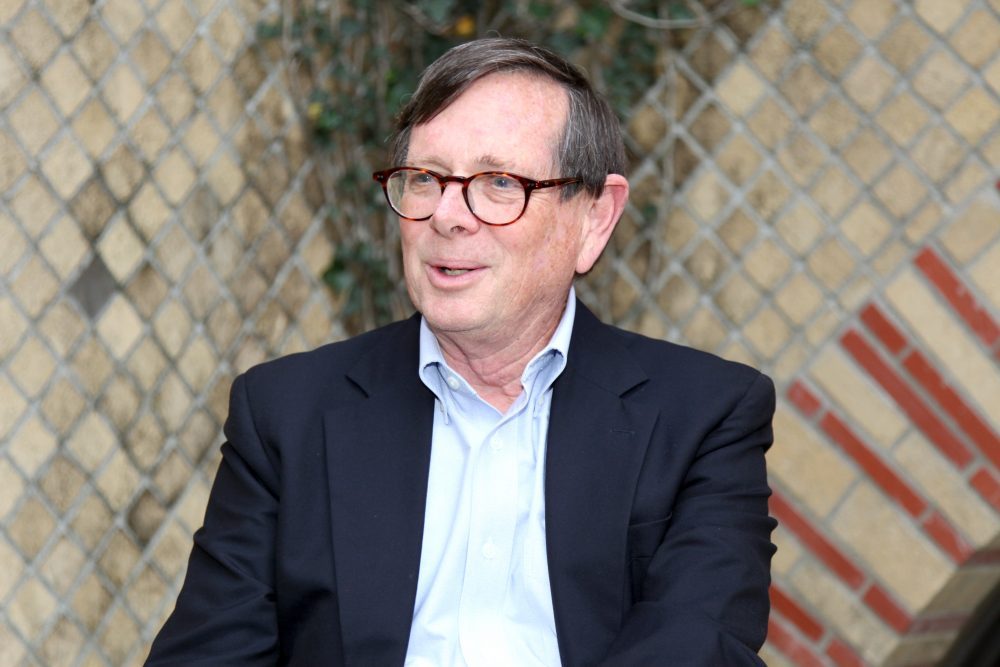
Photo by Aaron Salcido.
Roger Bagnall is a classics scholar at New York University. Before joining a panel discussion for a Zócalo/Getty “Open Art” event titled “What Can the Ancient World Teach Us About Globalization?” at the Getty Villa, he chatted in the green room about what makes a good Latin teacher, autumn in New York, and the code language in centuries-old papyrus scrolls.
Was there a teacher or professor who really shaped your life, maybe even changed the course of your life?
I had several teachers in college who’d played that role—none of whom was a particularly good teacher, by technical standards, class preparation, or whatever—but they were very interesting. Whereas some teachers who were more fluent in the classroom left me cold. They got me into the kinds of things that I’ve done later. But I’d come to college having survived a series of Latin teachers in high school who would have destroyed any interest in the ancient world, had I let them. So I think I’m a very stubborn person.
What’s the secret to teaching Latin, to making it come alive?
Mostly patience, I think. I’ve taught both elementary Latin and more elementary Greek, and I like doing it. But it does mean you cannot teach just to the quickest students in the class.
Do we still use Latin more in our daily lives than most of us realize?
For sure—both its native form as Latin, and of course buried in what we get from Latin in vocabulary, what we get from Latin in French vocabulary, and so forth. It’s all over.
You’re a papyrologist, who studies ancient papyrus, and you’re also an expert on graffiti in past civilizations. Did the ancients use these two forms of media to convey gossip and trivial thoughts as well as profound ones, the way we use our modern media?
Yes. You don’t find much political stuff in the papyri. It comes from everyday life, bureaucracy, and the economy—not from politics. But you do get letters making remarks about people that are sometimes fairly open. Letters didn’t have very good security or confidentiality, so you did want to watch out. There are letters written in slightly coded language, so the recipient will know what they’re saying but a casual opener of the letter wouldn’t know.
Was there any ancient politician who communicated in 140 characters with a lot of exclamation marks?
No, the political culture from that point of view was all oral and face to face.
Do you play a musical instrument?
I played the piano when I was younger, and one of my goals in retirement is to go back to practicing it. I’m retiring at the end of August.
What would you like to play?
Mostly Bach and Handel and Mozart.
Do you have a favorite season? And if you do, why?
Autumn. I tend to find summer a bit too hot, and autumn tends to be a little more consistent than spring in New York.
What are you reading for pleasure?
Peter Brooks’ book about Flaubert and George Sand’s correspondence and the wreckage of Paris in 1870. Just beginning it. I think it’s going to be very interesting. Before that, I finished Keep the Damned Women Out by Nancy Weiss Malkiel, about the process by which Harvard, Yale, Princeton, and Dartmouth went co-ed, and which also deals with three of the Seven Sisters in the same period, as well as Oxford and Cambridge. It’s written by a woman who was the dean of the college at Princeton for 24 years, and she has done her archival work and it is fabulous. The title comes from a letter from a Dartmouth alum. There’s a lot of stuff in the archive that makes you go, “God, I can’t believe that somebody said that!”
Do you have a favorite 20th-century U.S. author?
It might be Calvin Trillin.
His food writing or his political or humor writing?
The good writing. Also Runestruck, a novel. One of the funniest things I’ve ever read.
If you could time-travel to any period, what would it be?
Second quarter of the 18th century—lifetime of Bach and Handel. To hear those pieces for which the manuscripts have been lost. I do think of myself as an 18th-century person in a lot of ways, somebody who still believes the Enlightenment project was a good idea.



